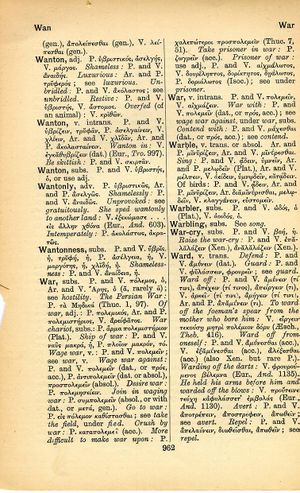ward
κεῖται μὲν γαίῃ φθίμενον δέμας, ἡ δὲ δοθεῖσα ψυχή μοι ναίει δώματ' ἐπουράνια → my body lies mouldering in the ground, but the soul entrusted to me dwells in heavenly abodes
English > Greek (Woodhouse)
v. trans.
Defend: P. and V. ἀμύνειν (dat.).
Guard: P. and V. φυλάσσειν, φρουρεῖν; see guard.
Ward off: P. and V. ἀμύνειν (τί τινι), ἀπέχειν (τί τινος), ἀπείργειν (τι), V. ἀρκεῖν (τί τινι), ἀρήγειν (τί τινι), Ar. and P. ἀπαμύνειν (τι).
To ward off the foeman's spear from the mother who bore him: V. εἴργειν τεκούσῃ μητρὶ πολέμιον δόρυ (Aesch., Theb. 416).
Ward off from oneself: P. and V. ἀμύνεσθαι (acc.), V. ἐξαμύνεσθαι (acc.), ἀλέξεσθαι (acc.) (also Xen. but rare P.).
Warding off the darts: V. φρουρούμενος βέλεμνα (Eur., And. 1135).
He held his arms before him and warded off the blows: V. προὔτεινε τεύχη κἀφυλάσσετʼ ἐμβολάς (Eur., And. 1130).
Avert: P. and V. ἀποτρέπειν, ἀποστρέφειν, ἀπωθεῖν; see avert.
Repel: P. and V. ἀπελαύνειν, διωθεῖσθαι, ἀπωθεῖν; see repel.
subs.
Protection: P. and V. φυλακή, ἡ.
Confinement: P. φυλακή, ἡ; see guard.
Put in ward: P. εἰς φυλακὴν ποιεῖσθαι.
Watch: P. and V. φυλακή, ἡ, φρουρά, ἡ, V. φρούρημα, τό; see watch.
Division of a town: P. κώμη, ἡ; see quarter.
One left without parents: use adj., P. and V. ὄρφανος, ὁ or ἡ.
Be a ward, v.: use P. ἐπιτροπεύεσθαι.

